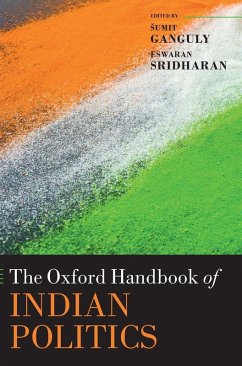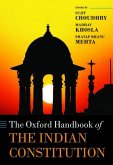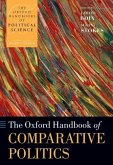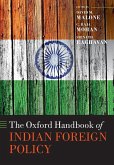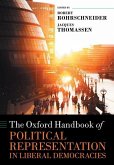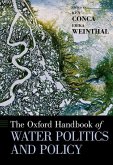- Gebundenes Buch
- Merkliste
- Auf die Merkliste
- Bewerten Bewerten
- Teilen
- Produkt teilen
- Produkterinnerung
- Produkterinnerung
The Oxford Handbook of Indian Politics provides the latest and most comprehensive overview of the state of contemporary Indian politics and examines the evolution of its core institutions, processes, policies, and associated issues over the past decade.
Andere Kunden interessierten sich auch für
![Oxford Handbook of the Indian Constitution Oxford Handbook of the Indian Constitution]() Sujit ChoudhryOxford Handbook of the Indian Constitution269,99 €
Sujit ChoudhryOxford Handbook of the Indian Constitution269,99 €![The Oxford Handbook of British Politics The Oxford Handbook of British Politics]() The Oxford Handbook of British Politics239,99 €
The Oxford Handbook of British Politics239,99 €![The Oxford Handbook of Comparative Politics The Oxford Handbook of Comparative Politics]() The Oxford Handbook of Comparative Politics47,99 €
The Oxford Handbook of Comparative Politics47,99 €![The Oxford Handbook of Scottish Politics The Oxford Handbook of Scottish Politics]() The Oxford Handbook of Scottish Politics224,99 €
The Oxford Handbook of Scottish Politics224,99 €![The Oxford Handbook of Indian Foreign Policy The Oxford Handbook of Indian Foreign Policy]() The Oxford Handbook of Indian Foreign Policy52,99 €
The Oxford Handbook of Indian Foreign Policy52,99 €![The Oxford Handbook of Political Representation in Liberal Democracies The Oxford Handbook of Political Representation in Liberal Democracies]() The Oxford Handbook of Political Representation in Liberal Democracies228,99 €
The Oxford Handbook of Political Representation in Liberal Democracies228,99 €![The Oxford Handbook of Water Politics and Policy The Oxford Handbook of Water Politics and Policy]() The Oxford Handbook of Water Politics and Policy232,99 €
The Oxford Handbook of Water Politics and Policy232,99 €-
-
-
The Oxford Handbook of Indian Politics provides the latest and most comprehensive overview of the state of contemporary Indian politics and examines the evolution of its core institutions, processes, policies, and associated issues over the past decade.
Hinweis: Dieser Artikel kann nur an eine deutsche Lieferadresse ausgeliefert werden.
Hinweis: Dieser Artikel kann nur an eine deutsche Lieferadresse ausgeliefert werden.
Produktdetails
- Produktdetails
- Verlag: Oxford University Press (UK)
- Seitenzahl: 672
- Erscheinungstermin: 5. September 2024
- Englisch
- Abmessung: 244mm x 170mm x 37mm
- Gewicht: 1252g
- ISBN-13: 9780198894261
- ISBN-10: 0198894260
- Artikelnr.: 69925719
- Herstellerkennzeichnung
- Libri GmbH
- Europaallee 1
- 36244 Bad Hersfeld
- gpsr@libri.de
- Verlag: Oxford University Press (UK)
- Seitenzahl: 672
- Erscheinungstermin: 5. September 2024
- Englisch
- Abmessung: 244mm x 170mm x 37mm
- Gewicht: 1252g
- ISBN-13: 9780198894261
- ISBN-10: 0198894260
- Artikelnr.: 69925719
- Herstellerkennzeichnung
- Libri GmbH
- Europaallee 1
- 36244 Bad Hersfeld
- gpsr@libri.de
Sumit Ganguly is a Senior Fellow and directs the Huntington Program on Strengthening US-India Relations at the Hoover Institution, Stanford University. He is Distinguished Professor of Political Science Emeritus and the Rabindranath Tagore Chair in Indian Cultures and Civilizations Emeritus at Indiana University, Bloomington.A specialist on the contemporary politics of South Asia, he is the author, co-author, editor, or co-editor of 20 books on the region.Professor Ganguly is member of the Council on Foreign Relations (New York) and a Fellow of the American Academy of Arts and Sciences. He serves on the editorial boards of Asian Security, Current History, Journal of Democracy, Foreign Policy Analysis, The Nonproliferation Review, Pacific Affairs, International Security, and Small Wars & Insurgencies.His most recent book (edited with Eswaran Sridharan) is The Oxford Handbook of Indian Politics. Eswaran Sridharanis the Academic Director and Chief Executive, University of Pennsylvania Institute for the Advanced Study of India (UPIASI), Delhi. He is a political scientist whose published work covers political parties, party system change, coalition politics, political finance, the political economy of liberalization, the Indian middle classes, and international relations theory and India as an emerging power. He has held visiting appointments at the London School of Economics, the Institute of Developing Economies (Tokyo), University of California, Berkeley, and the Institute of South Asian Studies, Singapore. He is the author, editor, or co-editor of twelve books, with three forthcoming titles, and has published 96 academic articles. He is the Editor-in-Chief ofIndia Review, published by Taylor & Francis, UK,and is on the editorial advisory boards ofCommonwealth and Comparative Politics,International Studies Review, andMillenial Asia.
* Editors' Introduction and Acknowledgements
* Section I: Core Institutions
* 1: Niraja Gopal Jayal: Rights and Citizenship
* 2: M. R. Madhavan: Lok Sabha
* 3: Sandeep Shastri: The Rajya Sabha: A 'Federal Chamber' Or A Mere
Upper House in the Indian Parliament?
* 4: Ajay K. Mehra: The Indian Cabinet
* 5: Ronojoy Sen: The Supreme Court
* Section II: Federalism and Local Politics
* 6: Rekha Saxena: The Changing Nature of Federalism in India
* 7: Ashutosh Kumar: Political Leadership in India
* 8: George Mathew: Politics in the Third Tier: Municipalities and
Panchayats
* Section III: Elections
* 9: Banasmita Bora: The Election Commission of India and Its Evolution
* 10: Sanjay Kumar: Elections in India: A Journey over the Last Seven
Decades
* 11: Rahul Verma: Media Exposure and Vote Choice in Indian Elections:
1996-2019
* Section IV: The Major Parties
* 12: Christophe Jaffrelot: BJP's Ideology, Structures, Sociology, and
Strategies
* 13: Zoya Hasan: Congress Party in Decline
* 14: Adam Ziegfeld: Regional Parties
* Section V: Parties and Coalitions
* 15: K. K. Kailash: Political Parties: Centralised Electoral Machines
* 16: Rekha Diwakar: The Party System
* 17: E. Sridharan: Coalition Politics in India
* Section VI: Caste, Gender, Migration
* 18: Suhas Palshikar: Caste and Politics: Limits of Democratization
* 19: Carole Spary: Women in Indian Politics
* 20: Ashwani Kumar and Shashwat Dhar: The Politics of Interstate
Migration in India
* Section VII: Money and Politics
* 21: Milan Vaishnav: Political Finance in India
* 22: Kanta Murali: State-Business Relations in India
* Section VIII: Secularism and Minorities
* 23: Rajeev Bhargava: Indian Secularism at Crossroads: An
Interpretation
* 24: Ashutosh Varshney: Communalism
* 25: Adnan Farooqui: Muslim Representation
* Section IX: Political Economy
* 26: Surupa Gupta: The Political Economy of Macroeconomic Policy in
India
* 27: John Echeverri-Gent: The Evolution of India's Economic
Regulation: From Dirigisme to the New Regulatory State
* 28: Diego Maiorano: The Politics of Public Service Delivery in India
* Section X: Political Violence
* 29: Paul Staniland: Insurgencies and Political Violence in India
* 30: Arvind Verma: Coercive Instruments of the State
* Section XI: Foreign Policy and Security
* 31: Sumit Ganguly: The Evolution of India's Foreign Policy
* 32: Arzan Tarapore: Indian Defence Policy
* 33: Happymon Jacob: Drivers of India's South Asia Policy
* 34: Anit Mukherjee: India's Civil-Military Relations
* 35: Gaurav Kampani: The New Normal: India's Quest for the 'Credible'
in Nuclear Deterrence
* Section I: Core Institutions
* 1: Niraja Gopal Jayal: Rights and Citizenship
* 2: M. R. Madhavan: Lok Sabha
* 3: Sandeep Shastri: The Rajya Sabha: A 'Federal Chamber' Or A Mere
Upper House in the Indian Parliament?
* 4: Ajay K. Mehra: The Indian Cabinet
* 5: Ronojoy Sen: The Supreme Court
* Section II: Federalism and Local Politics
* 6: Rekha Saxena: The Changing Nature of Federalism in India
* 7: Ashutosh Kumar: Political Leadership in India
* 8: George Mathew: Politics in the Third Tier: Municipalities and
Panchayats
* Section III: Elections
* 9: Banasmita Bora: The Election Commission of India and Its Evolution
* 10: Sanjay Kumar: Elections in India: A Journey over the Last Seven
Decades
* 11: Rahul Verma: Media Exposure and Vote Choice in Indian Elections:
1996-2019
* Section IV: The Major Parties
* 12: Christophe Jaffrelot: BJP's Ideology, Structures, Sociology, and
Strategies
* 13: Zoya Hasan: Congress Party in Decline
* 14: Adam Ziegfeld: Regional Parties
* Section V: Parties and Coalitions
* 15: K. K. Kailash: Political Parties: Centralised Electoral Machines
* 16: Rekha Diwakar: The Party System
* 17: E. Sridharan: Coalition Politics in India
* Section VI: Caste, Gender, Migration
* 18: Suhas Palshikar: Caste and Politics: Limits of Democratization
* 19: Carole Spary: Women in Indian Politics
* 20: Ashwani Kumar and Shashwat Dhar: The Politics of Interstate
Migration in India
* Section VII: Money and Politics
* 21: Milan Vaishnav: Political Finance in India
* 22: Kanta Murali: State-Business Relations in India
* Section VIII: Secularism and Minorities
* 23: Rajeev Bhargava: Indian Secularism at Crossroads: An
Interpretation
* 24: Ashutosh Varshney: Communalism
* 25: Adnan Farooqui: Muslim Representation
* Section IX: Political Economy
* 26: Surupa Gupta: The Political Economy of Macroeconomic Policy in
India
* 27: John Echeverri-Gent: The Evolution of India's Economic
Regulation: From Dirigisme to the New Regulatory State
* 28: Diego Maiorano: The Politics of Public Service Delivery in India
* Section X: Political Violence
* 29: Paul Staniland: Insurgencies and Political Violence in India
* 30: Arvind Verma: Coercive Instruments of the State
* Section XI: Foreign Policy and Security
* 31: Sumit Ganguly: The Evolution of India's Foreign Policy
* 32: Arzan Tarapore: Indian Defence Policy
* 33: Happymon Jacob: Drivers of India's South Asia Policy
* 34: Anit Mukherjee: India's Civil-Military Relations
* 35: Gaurav Kampani: The New Normal: India's Quest for the 'Credible'
in Nuclear Deterrence
* Editors' Introduction and Acknowledgements
* Section I: Core Institutions
* 1: Niraja Gopal Jayal: Rights and Citizenship
* 2: M. R. Madhavan: Lok Sabha
* 3: Sandeep Shastri: The Rajya Sabha: A 'Federal Chamber' Or A Mere
Upper House in the Indian Parliament?
* 4: Ajay K. Mehra: The Indian Cabinet
* 5: Ronojoy Sen: The Supreme Court
* Section II: Federalism and Local Politics
* 6: Rekha Saxena: The Changing Nature of Federalism in India
* 7: Ashutosh Kumar: Political Leadership in India
* 8: George Mathew: Politics in the Third Tier: Municipalities and
Panchayats
* Section III: Elections
* 9: Banasmita Bora: The Election Commission of India and Its Evolution
* 10: Sanjay Kumar: Elections in India: A Journey over the Last Seven
Decades
* 11: Rahul Verma: Media Exposure and Vote Choice in Indian Elections:
1996-2019
* Section IV: The Major Parties
* 12: Christophe Jaffrelot: BJP's Ideology, Structures, Sociology, and
Strategies
* 13: Zoya Hasan: Congress Party in Decline
* 14: Adam Ziegfeld: Regional Parties
* Section V: Parties and Coalitions
* 15: K. K. Kailash: Political Parties: Centralised Electoral Machines
* 16: Rekha Diwakar: The Party System
* 17: E. Sridharan: Coalition Politics in India
* Section VI: Caste, Gender, Migration
* 18: Suhas Palshikar: Caste and Politics: Limits of Democratization
* 19: Carole Spary: Women in Indian Politics
* 20: Ashwani Kumar and Shashwat Dhar: The Politics of Interstate
Migration in India
* Section VII: Money and Politics
* 21: Milan Vaishnav: Political Finance in India
* 22: Kanta Murali: State-Business Relations in India
* Section VIII: Secularism and Minorities
* 23: Rajeev Bhargava: Indian Secularism at Crossroads: An
Interpretation
* 24: Ashutosh Varshney: Communalism
* 25: Adnan Farooqui: Muslim Representation
* Section IX: Political Economy
* 26: Surupa Gupta: The Political Economy of Macroeconomic Policy in
India
* 27: John Echeverri-Gent: The Evolution of India's Economic
Regulation: From Dirigisme to the New Regulatory State
* 28: Diego Maiorano: The Politics of Public Service Delivery in India
* Section X: Political Violence
* 29: Paul Staniland: Insurgencies and Political Violence in India
* 30: Arvind Verma: Coercive Instruments of the State
* Section XI: Foreign Policy and Security
* 31: Sumit Ganguly: The Evolution of India's Foreign Policy
* 32: Arzan Tarapore: Indian Defence Policy
* 33: Happymon Jacob: Drivers of India's South Asia Policy
* 34: Anit Mukherjee: India's Civil-Military Relations
* 35: Gaurav Kampani: The New Normal: India's Quest for the 'Credible'
in Nuclear Deterrence
* Section I: Core Institutions
* 1: Niraja Gopal Jayal: Rights and Citizenship
* 2: M. R. Madhavan: Lok Sabha
* 3: Sandeep Shastri: The Rajya Sabha: A 'Federal Chamber' Or A Mere
Upper House in the Indian Parliament?
* 4: Ajay K. Mehra: The Indian Cabinet
* 5: Ronojoy Sen: The Supreme Court
* Section II: Federalism and Local Politics
* 6: Rekha Saxena: The Changing Nature of Federalism in India
* 7: Ashutosh Kumar: Political Leadership in India
* 8: George Mathew: Politics in the Third Tier: Municipalities and
Panchayats
* Section III: Elections
* 9: Banasmita Bora: The Election Commission of India and Its Evolution
* 10: Sanjay Kumar: Elections in India: A Journey over the Last Seven
Decades
* 11: Rahul Verma: Media Exposure and Vote Choice in Indian Elections:
1996-2019
* Section IV: The Major Parties
* 12: Christophe Jaffrelot: BJP's Ideology, Structures, Sociology, and
Strategies
* 13: Zoya Hasan: Congress Party in Decline
* 14: Adam Ziegfeld: Regional Parties
* Section V: Parties and Coalitions
* 15: K. K. Kailash: Political Parties: Centralised Electoral Machines
* 16: Rekha Diwakar: The Party System
* 17: E. Sridharan: Coalition Politics in India
* Section VI: Caste, Gender, Migration
* 18: Suhas Palshikar: Caste and Politics: Limits of Democratization
* 19: Carole Spary: Women in Indian Politics
* 20: Ashwani Kumar and Shashwat Dhar: The Politics of Interstate
Migration in India
* Section VII: Money and Politics
* 21: Milan Vaishnav: Political Finance in India
* 22: Kanta Murali: State-Business Relations in India
* Section VIII: Secularism and Minorities
* 23: Rajeev Bhargava: Indian Secularism at Crossroads: An
Interpretation
* 24: Ashutosh Varshney: Communalism
* 25: Adnan Farooqui: Muslim Representation
* Section IX: Political Economy
* 26: Surupa Gupta: The Political Economy of Macroeconomic Policy in
India
* 27: John Echeverri-Gent: The Evolution of India's Economic
Regulation: From Dirigisme to the New Regulatory State
* 28: Diego Maiorano: The Politics of Public Service Delivery in India
* Section X: Political Violence
* 29: Paul Staniland: Insurgencies and Political Violence in India
* 30: Arvind Verma: Coercive Instruments of the State
* Section XI: Foreign Policy and Security
* 31: Sumit Ganguly: The Evolution of India's Foreign Policy
* 32: Arzan Tarapore: Indian Defence Policy
* 33: Happymon Jacob: Drivers of India's South Asia Policy
* 34: Anit Mukherjee: India's Civil-Military Relations
* 35: Gaurav Kampani: The New Normal: India's Quest for the 'Credible'
in Nuclear Deterrence

